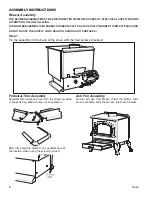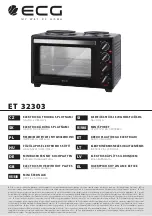
5
GO ECO Range
Issue 01.1 05/17
4.0
Important Safety Information
4.1.
WARNINGS AND IMPORTANT SAFETY INFORMATION
4.1.1.
READ THESE INSTRUCTIONS CAREFULLY BEFORE INSTALLATION!
These instructions cover the basic principles to ensure satisfactory installation of the stove,
although detail may need slight modification to suit particular local site conditions. In all cases
the installation must comply with current local regulations including Building Regulations,
Local Authority Byelaws and other specifications or regulations including UK or EU standards
referred to as they affect the installation of the stove. Approved Document J is particularly
important for England and Wales and can be downloaded for no cost at:
http://www.planningportal.gov.uk/england/professionals/en/4000000000503.html
Also of
importance are Approved Documents (A.D.) L1 A and B conservation of fuel and power. The
Domestic Heating Compliance Guide will also be found useful.
In addition to these instructions the requirements of BS 8303 and BS EN 15287 must be
fulfilled. The installation of a stove is a notifiable building works as defined in the building
regulations and it is a legal requirement under England and Wales Building Regulations that
the installation is either carried out under Local Authority Building Control approval or is
installed by a Competent Person registered with a Government approved Competent Persons
Scheme. HETAS Ltd operate such a Scheme and a listing of their Registered Competent
Persons can be found on their website at
www.hetas.co.uk
.
4.1.2.
Important Chimney Warning
This stove must not be installed into a shared chimney that serves any other heating appliance.
4.1.3.
Extractor Fan Warning
There must not be an extractor fan fitted in the same room as the stove as this can cause the
stove to emit fumes into the room. If unavoidable the appliance must be checked with
Approved Document (A.D.) 1.21 and necessary action taken.
4.1.4.
Cleaning and Chimney Sweeping
The appliance, flue & chimney must be cleaned and checked internally and externally
regularly in use and especially after a period of disuse (e.g. after summer). Lift down the baffle
at least weekly to check for build up of soot or debris on the top from the flue pipe. Remove the
baffle and check the flue spigot and connector is fully clear at regular intervals. The chimney
and flue connector must be swept at least annually, more often when used with sooty fuels or
damp wood. The chimney or flue can usually be swept through the appliance. A wire centred
sweeps brush with guide wheel is recommended. Any loose, broken or leaking joints or flue
ways MUST be repaired immediately.







































